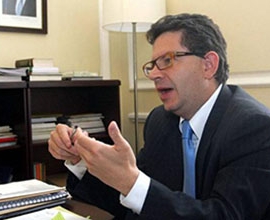The issue of corruption is not only an issue for the government but also one of society overall"
31/01/2014
PrintRafael Merchán, Secretary of Transparency of the Presidency of the Republic of Colombia
The Secretariat of Transparency is making a major effort in the anti-corruption area, how would you assess the work being done?
The Secretariat of Transparency is a relatively new institution; it was created in November 2011 and until now has been focusing its work on creating an anti-corruption policy and documenting cases with high impact in this area. We have three great challenges: the first is to be a liaison channel with other institutions to the extent that we are not investigators nor are we involved with punishment; therefore what we need is to have certain facilitators to build these cases, and we have to have a very active coordination effort with the institutions that have this investigative and punitive responsibility. Another great challenge is the entry into force of the Transparency and Right of Access to Public Information Law, which is close to being signed by the President of the Republic, and, in the third place, all the components of the anti-corruption policy that will be reflected in a decision of the Council of Ministers to be taken in late October or early November.
In all these challenges, how is FIIAPP, through the EUROsociAL Programme, helping to define this transparency policy?
They have been very important strategic partners. With EUROsociAL we've been working on many themes, for example the role of the private sector, which is for us one of the essential axes of the policy because without a clear principle of shared responsibility, it is going to be very difficult to address this scourge effectively. Work was done on documents having to do with the responsibility of legal persons when they commit corrupt acts, and events have been organised on access to the information needed to reach this step prior to punishment under the law. There was a very fluid relationship, and we are waiting with great expectations for the start of the programme with the FIIAPP in the framework of the cooperation project that was signed between the Colombian government and the European Union that we are designing and in which there are different sectoral information access themes, both preventive and punitive, particularly in health and mining.
A political change is also taking place based on a social change. Is Colombian society aware of the problem of corruption?
Increasingly, but no doubt a major strategy involving a culture of legality is needed. This is another one of the basic components of the policy that we're designing and where we have to work hand in hand with the educational sector, with the universities, with the media. For example, in a few days we're launching a campaign called "filminutos por la transparencia [film minutes for transparency] in which any citizen with a camera, a tablet, can make a video and join the contest. The best ones will be shown in all the movie theatres in the country and will be awarded a cash prize. With these types of initiatives we hope that people will become more aware of the issue of corruption and understand that it is not only an issue for the government but also of society as a whole.
Work is being done on many issues with EUROsociAL and FIIAPP, what do you consider to be the largest problem that requires the most effort?
I believe we have to give as much importance to the preventive part as to the punitive part. A strategy that doesn't take into account the importance of society as a whole understanding the damage corruption causes would be short-sighted. And it would be impossible to imagine that a strategy would be effective without effective prosecution of these cases, without a strategy for recovering the resources and proceeds of corruption. I always make the analogy of a two-wheeled bicycle: if one of the two wheels doesn't work or isn't aligned, the strategy doesn't work and the cyclist falls off.
FIIAPP

